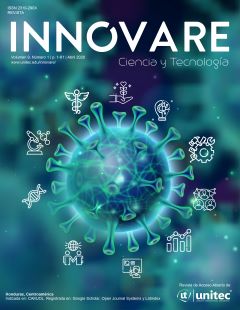First three weeks of a free telemedicine clinic for COVID-19 in Honduras
DOI:
https://doi.org/10.5377/innovare.v9i1.9655Keywords:
COVID-19, eHealth, TelemedicineAbstract
Introduction: The COVID-19 pandemic has accelerated the implementation of telemedicine in Honduras to meet the needs of patients with or without suspected disease. This study evaluates the implementation of the Virtual Solidary Clinic COVID-19 in Honduras during its first three weeks.
Methods: The clinic opened on March 12, 2020 thanks to the collaborative work of the Aliv.io telemedicine company, the Fundación Lucas para la Salud and Universidad Tecnológica Centroamericana en Honduras. The digital platform has an electronic patient record and a video call system accessible by cell phone, tablet or computer. Patients had the option of consulting with 5 general practitioners and 2 medical specialists available to patients across the country.
Results: 54 tele-consultations were carried out in the first three weeks of operation, 46 (85%) were seen for the first time and 8 (15%) were seen as follow-up cases, the average age of patients was 33 years, living in seven departments of the country and three Honduran living in foreign countries. Only 4% had criteria to suspect COVID-19. Time per consultation was from 17 to 30 minutes. User´s satisfaction rating was positive in all cases. The main barriers reported were internet navigation difficulties by users, some patients attributed that to perceived platform complexity, problems with internet quality and lack of technology skills.
Conclusion: Users had good acceptance towards the virtual clinic, and the experience pointed to some aspects that should be improved, this will be taken into account for the continuation of the service during the pandemic, especially regarding advertising and education for users.
Downloads
1881




